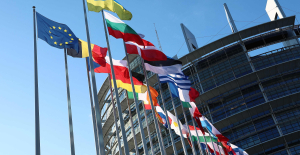In September 1634, it suddenly looked as if the great war that would go down in history at the age of thirty would only last 16 years. The Imperial-Bavarian army, reinforced by a Spanish contingent, had crushed the Swedes in front of the town of Nördlingen. Their losses are said to have been up to 8000 dead and 4000 prisoners, one of their commanders, Gustaf Horn, was taken prisoner of war. The Habsburg victors only lost 2,000 men.
The Swedish position in southern Germany collapsed in one fell swoop. In retreat, the Swedes robbed what was left, not distinguishing between opponents and allies. The Heilbronner Bund, which Sweden had concluded with the Protestant estates of southern Germany, dissolved. Württemberg and Baden were occupied by Imperial and Bavarian troops. The two most important partners of the Swedes, the Electors of Saxony and Brandenburg, suddenly saw the opportunity to terminate their allegiance, which had long become a burden.
The tactics of the Swedish Imperial Chancellor Axel Oxenstierna, who determined Stockholm politics after the death of Gustav II Adolf near Lützen in 1632, were a thorn in the side of Saxony in particular as the head of the Lutherans in the empire, as he aimed at the establishment of a Swedish-German federal state . From the summer of 1634, emissaries from Elector Johann Georg I and Emperor Ferdinand II were therefore negotiating a peace treaty.
After 30 years of war, Germany is ruined in 1648. Around 40 percent of the population fell victim to war, hunger and epidemics.
Source: WORLD
The defeat of Nördlingen, which had also been one for Saxony, put the talks on a new footing. The result was the Peace of Prague, signed on May 30, 1635. It was "the most important contribution to peace during the Thirty Years' War," wrote the Augsburg historian Johannes Burkhardt in his book "The War of Wars" (Klett-Cotta). The book bears its subtitle "A New History of the Thirty Years' War" for good reason. Because the specialist in the early modern period, who died in August 2022, was less concerned with a panorama of politics, war and suffering in this major essay than with the question of why this horrific conflict was not ended in time.
It is not for nothing that the poet Andreas Gryphius lamented in his sonnet “Tears of the Fatherland” in 1634: “Three times it has been six years since our river flood/ Almost clogged with corpses, slowly pushed its way away./ But I’m still silent about what’s worse than death,/ What is worse than the plague, and embers and famine,/ that the treasure of souls was also stolen from so many.”
In this sense, the Peace of Prague and its failure are exemplary. First of all, it pointed to the future, since it had not been debated or confirmed at any Reichstag. It was also not a "subjugation treaty of a rebel who was reconciled with the ruler" (Burkhardt), but it was signed by two almost equal princes. Although numerous provisions only applied to Electoral Saxony, the leading power of the Protestant estates, all others were invited to join the pact. "Here ... the imperial constitution was broken in order to save the imperial constitution," concludes Burkhardt.
Her title was often greater than her power. But for centuries, the emperors represented the Holy Roman Empire of German Nations. Almost all were Habsburgs.
Source: WORLD
The conclusion of peace was only made possible by the aging emperor's realization that he would have to give up the maximum goals of his earlier years. As late as 1629, after the victorious campaigns of his general Wallenstein, who had brought large parts of northern Germany under direct imperial control for the first time, Ferdinand II had issued a so-called restitution edict. After that, the spiritual possessions in the empire were to be brought back to the level of 1552, which would have reduced the possessions of almost all Protestant imperial estates.
This counter-reformation maximum demand had created the basis for the Swedish intervention in 1630. Faced with the choice of giving up their profits from the Reformation or fighting the armies of the Counter-Reformation with Gustav II Adolf, the Saxons and other Protestants backed the Swedish card. By then, at the latest, the great German war had become an international one. Sweden could only lead him because France paid him subsidies. Its first minister, Cardinal Richelieu, saw the chance to finally break the grip of Spain and Austria.
The core of the Peace of Prague was therefore a religious-political compromise. 1627 was taken as the "normal year". This meant that in the south of the empire the Catholics could keep their gains, but in the north the Protestant secularizations were accepted. It was to remain so for the next 40 years. Only then should a joint commission decide disputes. In case of doubt, the normal year 1627 would remain. In this subtle way, Ferdinand's edict of restitution was effectively quashed, with one exception. Under no circumstances did Ferdinand want to concede this solution to the Habsburg hereditary lands.
Not only Brandenburg, but also Catholic Bavaria, whose army had contributed significantly to Ferdinand's victories, joined the Prague treaty. Since they were followed by the Catholic estates and numerous Protestant estates, the political unity of the empire was largely restored. However, the reformed estates that had fought against the emperor were denied amnesty.
His accompanying national rhetoric and hopes for an end to the war unleashed a wave of patriotic enthusiasm that brought a unification of military forces against the foreign armies within reach. A new "imperial army", according to the grand vision, should drive the Swedes and Spaniards out of the country, and then the war would finally be over.
But why did the “long-desired reassurance of the dear fatherland of the German nation” that the Peace of Prague promised so full-bodiedly fail? Because it was no longer a matter for the Germans. Sweden, which after all occupied large parts of northern Germany or could threaten it at any time with its troops, was not involved. This also applied to France and Spain.
Burkhardt writes that Queen Christine and the Reichsrat in Stockholm had shown their willingness to finally end the costly war adventure in the distant country. But Chancellor Oxenstierna soon succumbed to French "advances of support". And the officers on the ground also didn't want to hear about the meager offers that Saxony offered them for the withdrawal.
Cardinal Richelieu was alarmed. To keep Sweden from withdrawing from the war, he immediately increased his offers of subsidies. At the same time, the exclusion of the Reformed from the Peace of Prague ensured that some princes in the empire continued to play the French card. Even the mighty Duke Maximilian I of Bavaria, who was again granted the Palatinate electorate in Prague, did not want to sever his connection to Paris, as it promised to be a counterbalance to the growing power of the emperor. The prospect that Ferdinand was well on the way to restricting their liberties in a centralized empire also filled other princes with suspicion.
Richelieu succeeded in including the Netherlands in the alliance against the Habsburg powers of Spain and Austria. First he declared war on Spain, then on the Emperor. With that, however, the "now fully unleashed and clearly evident wartime violence between the three universal powers Habsburg, France and Sweden not only dragged on in the last long period of war, but (went down) once again monstrously increased over the population," Burkhardt sums up.
You can also find "World History" on Facebook. We are happy about a like.
This article was first published in November 2019.

 The Euribor today remains at 3.734%
The Euribor today remains at 3.734% Germany: the trial of an AfD leader, accused of chanting a Nazi slogan, resumes this Tuesday
Germany: the trial of an AfD leader, accused of chanting a Nazi slogan, resumes this Tuesday New York: at Columbia University, the anti-Semitic drift of pro-Palestinian demonstrations
New York: at Columbia University, the anti-Semitic drift of pro-Palestinian demonstrations What is Akila, the mission in which the Charles de Gaulle is participating under NATO command?
What is Akila, the mission in which the Charles de Gaulle is participating under NATO command? What High Blood Pressure Does to Your Body (And Why It Should Be Treated)
What High Blood Pressure Does to Your Body (And Why It Should Be Treated) Vaccination in France has progressed in 2023, rejoices Public Health France
Vaccination in France has progressed in 2023, rejoices Public Health France Food additives suspected of promoting cardiovascular diseases
Food additives suspected of promoting cardiovascular diseases “Even morphine doesn’t work”: Léane, 17, victim of the adverse effects of an antibiotic
“Even morphine doesn’t work”: Léane, 17, victim of the adverse effects of an antibiotic MEPs validate reform of EU budgetary rules
MEPs validate reform of EU budgetary rules “Public Transport Paris 2024”, the application for Olympic Games spectators, is available
“Public Transport Paris 2024”, the application for Olympic Games spectators, is available Spotify goes green in the first quarter and sees its number of paying subscribers increase
Spotify goes green in the first quarter and sees its number of paying subscribers increase Xavier Niel finalizes the sale of his shares in the Le Monde group to an independent fund
Xavier Niel finalizes the sale of his shares in the Le Monde group to an independent fund Owner of Blondie and Shakira catalogs in favor of $1.5 billion offer
Owner of Blondie and Shakira catalogs in favor of $1.5 billion offer Cher et Ozzy Osbourne rejoignent le Rock and Roll Hall of Fame
Cher et Ozzy Osbourne rejoignent le Rock and Roll Hall of Fame Three months before the Olympic Games, festivals and concert halls fear paying the price
Three months before the Olympic Games, festivals and concert halls fear paying the price With Brigitte Macron, Aya Nakamura sows new clues about her participation in the Olympics
With Brigitte Macron, Aya Nakamura sows new clues about her participation in the Olympics Skoda Kodiaq 2024: a 'beast' plug-in hybrid SUV
Skoda Kodiaq 2024: a 'beast' plug-in hybrid SUV Tesla launches a new Model Y with 600 km of autonomy at a "more accessible price"
Tesla launches a new Model Y with 600 km of autonomy at a "more accessible price" The 10 best-selling cars in March 2024 in Spain: sales fall due to Easter
The 10 best-selling cars in March 2024 in Spain: sales fall due to Easter A private jet company buys more than 100 flying cars
A private jet company buys more than 100 flying cars This is how housing prices have changed in Spain in the last decade
This is how housing prices have changed in Spain in the last decade The home mortgage firm drops 10% in January and interest soars to 3.46%
The home mortgage firm drops 10% in January and interest soars to 3.46% The jewel of the Rocío de Nagüeles urbanization: a dream villa in Marbella
The jewel of the Rocío de Nagüeles urbanization: a dream villa in Marbella Rental prices grow by 7.3% in February: where does it go up and where does it go down?
Rental prices grow by 7.3% in February: where does it go up and where does it go down? Europeans: “All those who claim that we don’t need Europe are liars”, criticizes Bayrou
Europeans: “All those who claim that we don’t need Europe are liars”, criticizes Bayrou With the promise of a “real burst of authority”, Gabriel Attal provokes the ire of the opposition
With the promise of a “real burst of authority”, Gabriel Attal provokes the ire of the opposition Europeans: the schedule of debates to follow between now and June 9
Europeans: the schedule of debates to follow between now and June 9 Europeans: “In France, there is a left and there is a right,” assures Bellamy
Europeans: “In France, there is a left and there is a right,” assures Bellamy These French cities that will boycott the World Cup in Qatar
These French cities that will boycott the World Cup in Qatar Serie A: Bologna surprises AS Rome in the race for the C1
Serie A: Bologna surprises AS Rome in the race for the C1 Serie A: Marcus Thuram king of Italy, end of the debate for the position of number 9 with the Blues?
Serie A: Marcus Thuram king of Italy, end of the debate for the position of number 9 with the Blues? Milan AC-Inter Milan: Thuram and Pavard impeccable, Hernandez helpless… The tops and flops of the derby
Milan AC-Inter Milan: Thuram and Pavard impeccable, Hernandez helpless… The tops and flops of the derby Ligue 2: Auxerre leader, Bordeaux in crisis, play-offs... 5 questions about an exciting end of the season
Ligue 2: Auxerre leader, Bordeaux in crisis, play-offs... 5 questions about an exciting end of the season


















